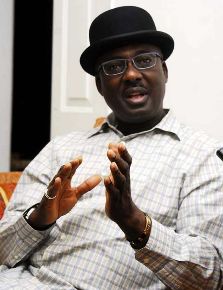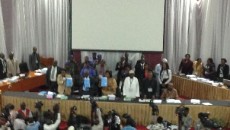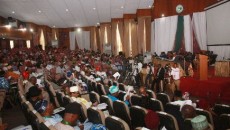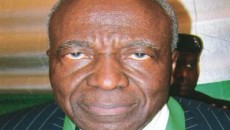The Chairman,
Ladies and Gentlemen
This Conference comes at a very critical moment in Nigeria’s history – 54 years after independence. I commend the convener of this conference, His Excellency, President Goodluck Ebele Jonathan, GCFR for taking this bold step as I do believe that a holistic review of our union is a sine qua non to rapid national development. A proper re-engineering of our polity will give Nigeria a balanced federation, ensure true fiscal federalism and unlock the boundless energies and creativity of Nigerians. The time has come to look at issues from the perspective of true Nationalists and not as ethnic or regional champions.
Some of the powers that be have ensured that some of those who have something to say have nowhere to say it, so they can continually deny our country the voice and services of patriots, but I thank God for Mr. President that has provided a forum for ordinary Nigerians like me to air our views to the most important audience in a democratic system – the Nigerian people. I am indeed honored and happy to be here in the midst of progressives and true patriots, brothers and kindred spirits.
Fortune has once again presented our dear country with a unique opportunity in its 54 years of existence as an independent nation, to turn the corner and begin to find its rightful place in the comity of developed nations. We turned the first corner in 1960 when we had independence and began the practice of parliamentary democracy under a regional structure, with a healthy measure of financial autonomy for the regions. Our country made rapid progress in all sectors but in 1966, the tensions left by the colonialists reached boiling point and we descended into a fratricidal civil war that has left its mark in the psyche of the nation up till today. Politics and group rivalry became the order of the day at the expense of nationalism, objectivity and productivity. Many demons, including State creation, concentration of powers at the centre, unproductive democracy, nepotism, tribalism, coup d’états and inevitably corruption were born. These demons still haunt us till today.
The journey we began 54 years ago is still on with no signs of the ultimate destination and nowhere near El Dorado. Others that began the same journey at about the same time like Malaysia, Singapore, Indonesia are much nearer their destination and are now categorized as developed nations. There is no doubting the fact that we haven’t made much progress and a lot needs to be done, hence the urgency of this exercise.
Sovereignty indeed lies here and the yearnings of Nigerians captured in the position of our socio-cultural groups from Afenifere, Ohaneze Ndi-Igbo, Arewa Consultative Forum, etc., should be brought here for collation.
It is in this vein that I have come to place my humble views before this noble assembly to ensure that we are governed in keeping with our laws, to ensure that democracy will not just be a ritual but a government of the people by the people and for the people.
I submit my humble views to you with a plea that you forgive any transgressions in substance or form, and I pledge that I come here as a nationalist and a believer in one united and strong Nigeria, anchored on the creed of “unity in diversity”. That my position has not been influenced by any ethnic, tribal or gender bias but is based on what I believe to be the overall best interest of our country and our people. I do not claim the view to be original but that I share them with many others.
I am motivated by a desire to bequeath a better, more united, prosperous and equitable country to our children, so that they do not go through what we have gone through.
Consequently, permit me to make the following observations and proposals:
DEVOLUTION OF POWERS
It is my view that Nigeria is in need of a more decentralized government. This means that the powers of the central government should be reduced and more powers be given to the state or regions with respect to certain issues, especially those that involve local knowledge and peculiar circumstances. For instance, issues like the waterways or ports in Nigeria ought to be handled by the governments in the States where the water is situated because it is the state governments that have more direct proximity to the water bodies and therefore understand the socio-political and economic issues that surround it. This principle should also apply to the Police because it is the Local Police that understand the people and terrain better. The state government or regional governments are therefore in a better position to formulate policies and laws that would protect its indigenes.
Looking at global developments over the past three decades, the developing world has also seen increasing devolution of political and economic power to regions, state or local governments. Many countries such as Bolivia, Brazil, China, India, Indonesia, Pakistan, South Africa and Uganda have successfully taken advantage of devolution or decentralization of powers as a means of deepening integrative or participatory democracy, along with privatization and deregulation. Some of these countries witnessed a radical shift toward comprehensive political and economic decentralization: Bolivia in 1995 and Indonesia after the fall of Suharto in 1998. Brazil and India decentralized in an uneven and more gradual manner. In China local governments were granted much economic but little political power. South Africa made the transition from the undemocratic decentralization of apartheid to decentralization under a democratic constitution. (P. Bardhan and Dilp Mowkherjee; 2006). I strongly believe that Nigeria is in need of this as well.
I believe that devolution of powers would also serve a larger purpose in Nigeria by making ethnic and regional minorities feel more secure in themselves and hence more willing to accept the authority and legitimacy of the larger national state. I know we are going to talk a lot about unity in Nigeria in this forum and, of course, this issue cannot be over-stressed in view of the current insecurity and conflicts with religious and ethnic undertones that have been plaguing the nation recently. I also know that it may sound antithetical to the unity of Nigeria for me to now speak of according more powers to regional governments but it is my believe, and studies internationally have also shown that if different ethnic and regional minorities are given more autonomy or ability to determine their own local affairs with respect to education, culture, and economic development, they will feel more secure and be more willing to accept the authority and legitimacy of the larger national state. (See Kauzya J.M: 2007). Hence we can achieve a stronger and more efficient centre by according more autonomy to the regions or states.
Consequently, such issues as Aviation, including airports, safety of aircraft and carriage of passenger and goods by air; Bankruptcy and insolvency, borrowing of money within and outside Nigeria for the purposes of a state, drugs and poisons, Evidence, Incorporation, regulation and winding up of bodies corporate, insurance, Labour, including trade Unions, industrial relation, conditions, safety and welfare of labour, industrial disputes, minimum wage, Mines and Minerals, including oil fields, oil mining, geological surveys and natural gas; Post, Telegraph and telephones, Prisons, Police, Railways, Police, the formation, annulment and dissolution of marriages, weights and measures, trade and commerce, including registration of business names etc should be removed from the Exclusive Legislative List.
Also the issues such as electricity and the establishment of electric power stations, the generation and transmission of electricity, the regulation of the right of any person or authority to use, work or operate any plant, apparatus, equipment or work designed for the supply or use of electrical energy should be handled solely by the proposed regions or states.
1. CREATION OF MORE STATES:
It is well known that the average Nigerian has a penchant for looking at issues from the perspective of where he/she comes from, i.e. whether one is from the north or south, east or west. This attitude has so much permeated into every aspect of our society that it is now considered internationally that Nigeria is actually a weak state held together very loosely by weak chords, doomed, if not well managed, to disintegrate sooner or later. It is my view that the creation of more states only widens the cracks that already exist in our minds as a result of tribalism and also only adds to government expenditure and administrative costs. We do not need to further complicate our polity by creating more and more states. Rather we should consider simplifying our government by reducing our states into regions and giving these regions more powers and leverage to function independently, as is seen in other developed countries like the US. I am not one to advocate for copious adoption of policies or governmental patterns simply because it works in another country and because that country happens to be categorized as “developed”. I am not one for that. But I strongly believe in adopting a pattern because it makes practical and logical sense in view of our history and our own peculiar socio-political circumstances.
Today, many of the states that have been created are not viable, for instance after paying salaries some have nothing left in their purse for development. Their budget is almost 80 percent recurrent. Thus, rather than thinking of creating more states that are under-performing, we should be clamoring to go back to regionalism.
Also, the creation of more states has not stopped people from thinking of themselves as “from the North” or “from the South” and same for the East and West. We must find a way to stop such thinking and get people to think as Nigerians, because, like I have said earlier, our current difficulties are being suffered equally by all parts of the country.
2. Recognition of the Six Geo-Political Zones in the Constitution
It is my recommendation that the six Geo-Political zones should be formally recognized and accorded more powers in the constitution. As I said earlier, I believe that the unity of Nigeria can be better guaranteed if the structure allows the constituent parts to express themselves and their creativity. The unity of Nigeria should be anchored by unbundling the centre and allowing for devolution of powers to regional structures, perhaps based on the six geo political zones. We have practiced regional governments before and we know that it was a less complex system. There were fewer avenues for corruption. If you also look carefully, the progress that we were able to record that were outstanding were during the times of the regions. The northern region had groundnut pyramids, the west had cocoa and built cocoa house, and the east/south had oil palm. I strongly believe that the system of creation of states has not helped us and we should consider returning the country to the earlier model of division into six geo-political zones.
3. Local Government
I have always spoken of simplifying the political system and expunging potential loopholes for corruption and looting of government funds. This period of constitutional review is a good time to ask ourselves why we should have a total of 774 local governments in this country and if there are really any benefits of this. In my view, the number of Local Governments in Nigeria should be reduced, or better still, Local Governments should be removed and replaced with divisions that would be much larger in size than the local governments. We can convert the Senatorial zones to divisions in place of local governments. I believe this would significantly reduce the number of sub-governments in the country, further reduce administrative costs of governance in the country, and also simplify the political structure of the country and ultimately curb corruption.
4. Nigerian Police
I am of the view that the Nigerian Police and some of the powers of security should be transferred to the regions with initial national oversight. I think that if we revert to regionalism then regional governments can have a Police force. There must also be some central control mechanism so that we can prevent abuse. The fears that many people have expressed is that if you have state police, some governors who do not have the right temperament or discipline, and are not democrats may use the state police as a private army against their opponents. That is the main fear. I believe however that if you have police forces at regional government levels it is difficult to manipulate the regional police even by the premier of the region, because in regions there would be different ethnic groups, and since it is a much bigger geographical entity, it would be more difficult as it were to corner and put the regional police in one’s pocket to use at will. There would also be creative tension because it will be a robust structure with different ethnic nationalities. For a start we can have a strong central oversight on the police force. When the regional police systems are strengthened, the centre can gradually grant them more independence. It is my view therefore that S. 214 of the Constitution should be reviewed to allow for Regional policing.
5.THE LEGISLATURE
I share the view of those asking for parliamentary system of governance, who believe that it is cheaper to run, more suited to a developing economy with myriads of urgent national issues to tackle. It also expedites governmental decisions taking and creates more accord between the legislature and the executive where a ruling party has clear majority.
I would like to shed more light on this. My support for a parliamentary system is partly because to be a Minister in this system of government, you must first of all run for an election and be elected into parliament, so you find that between the arms of government there is more synergy. I also think it is better for developing countries that require consensus for urgent national issues. It will also put a final lie to what I call “pseudo technocracy”, where people fold their arms and watch others campaign to enthrone governments, and they go and take portfolios on the grounds of being “technocrats”. What criteria, I ask, is used to determine who is or who is not a technocrat? Is it the first class degrees which some politicians also have? A parliamentary system of government would make the Ministers more active in campaigning and getting to interact with those they want to rule; to understand their needs and be accessible to them, rather than playing a passive role and relaxing under the sign-post of being a “technocrat”.
I also believe that a Bi-Cameral Legislature may not be the best for Nigeria now given the present economic situations. It is my view that a bicameral legislature is cumbersome, the numbers are many and the resources to sustain same are enormous.
A unicameral legislature is also more commonly practiced internationally. Approximately half of the government of sovereign states in the world today are presently unicameral, including both the most populous (the People’s Republic of China) and the least populous (the Vatican City). New Zealand and Denmark only recently abolished one of their two chambers and so changed their systems from bicameral to unicameral.
America is a very wealthy and productive nation, and can readily afford the Presidential system of government with a bicameral legislature. I think we do not have the luxury of such resources.
Also our oil production of 2.4 million barrels per day for a population of over 170 million is nothing compared to Norway’s similar production for a population of less than 5 million people. Our “re-based” GDP is $509.9 billion with an unemployment rate of 23.9% and income per capita of $2,688. We are indeed a poor country. So, to continue to practice this American system the way it is done will do us no good. The time has come for us to take a critical look at this.
With a unicameral legislature we can ensure cost effectiveness in governance. We must look at the possibility of reducing the number of Legislators in such a way that they can be adequately taken care of. Each State would be divided into 3 Zones, approximately the current senatorial districts, with a parliamentarian representing each zone. These would form the Federal Legislature.
The Regional Legislature would be drawn from the present Federal Constituencies. This will also ensure a robust Regional Assembly. The argument maybe made that the more the number of legislators, the more the representation but practice has shown that this is not necessarily the case. In these days of modern technology and information system, it is easy for a Legislator to have access to his constituency and even travel round it in 2 days. So, if these be case, why then do we still have such a large national legislature?
6. TENURE OF OFFICE
I will propose a single tenure of at least 7 years for the executive, i.e the President, Governors or Premiers of the States and Regions respectively. The current 4 years tenure with a two term limit has not served us well. Elections and campaigns with all the attendant intrigues have become too frequent, leaving little time for governance and development. After the elections and swearing in of the executive in 2011, we have already began to hear talk about 2015 elections. These talks often distract governments from performing and delivering on their promises and it effectively leaves only about 2 years out of a 4 year tenure for governance. The first year is spent putting in place the structures of governance, the second and third for governance and the forth for another election.
Our country cannot afford the expenditure of this regular ritual. INEC is reported to have spent about N470B in the 2011 elections that did not produce any real change in the executive level because of the power of incumbency. Why must we put our country and populace through the agony of this electoral process, with the attendant saber rattling, violence, when almost all the contestants would be returned. A loss in the election is often an exception to the rule.
Where an incumbent is eventually defeated, it takes almost everything out of the victor and traumatizes the polity because of the power of incumbency. Elections will be made more peaceful if incumbents only serve one term, execute their programs and leave. It will also save the colossal waste of resources in what is really a ritual as no real changes are achieved. It interferes with the process of governance and allows for too much politics and no development.
CONCLUSION:
In conclusion, I would like to commend those who began the clamor for restructuring of our country. What was initially a fringe view for restructuring, is now a mainstream position, rooted in common sense. I believe the opinion of the socio cultural groups that are clamoring for change, is not just their views alone but that of a majority of Nigerians and so their views must not be disregarded. These views have become very common now, like the different groups asking for fiscal federalism, a return to regionalism, for parliamentary system of governance, etc.
Mr. Chairman, I thank you for this opportunity. I know that there are so many other issues to talk on and I believe we will have time to touch on them.
May God bless you all and may God bless Nigeria.
HON. PRINCE CHIBUDOM NWUCHE, OFR.
Former Deputy Speaker, House of Representatives.



